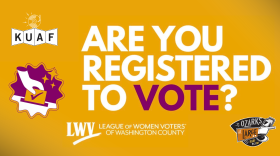In 2018 Melissa Eudey gave birth to her son, but the experience was not what she expected.
"This can't be what birth is,” she said. “Unfortunately, it does, you know, for a lot of women, and so I decided, hey, I'm going to be that person that that is going to provide that support and that education so that maybe people don't even have to go through what I went through."
Almost a year after the painful birth, she was still reeling and didn't know where to place that frustration until she found a doula through a social media app for new moms.
"Everything she said really resonated with me,” she said. “And I was like, Oh, what is that? Even at that time, I was like, you know, I think a doula is like the midwife or I kind of had also that misconception but yeah, never really heard the word like growing up or or anything."
Eudey is now a certified doula. She said the profession can be a little misunderstood. Doulas are not doctors or clinicians - so they aren't licensed to deliver a baby themselves. But they do provide a holistic spectrum of care, support and knowledge for mothers.
Eudey said she helps expecting and new mothers demystify birth and post-partum.
"You always see like, water breaking, like rushing to the hospital in movies and shows, women in pain, like, you know, screaming, all those things,” she said. “They think, oh, that's what it's gonna be like, for those 24-48 whatever hours, but really, the start of labor is literally a process that's unfolding and it's gonna take however long it takes. And the important thing is that you have those tools and that knowledge to ground you in that fact. Whatever those comforting tools might be."
She said doulas walk clients through everything from pelvic floor exercises and breathing techniques to what to expect from giving birth in a hospital or at home and what complications could arise.
And while more women are seeking out doulas. It's still relatively rare in Arkansas.
Juli McWhorter is the chief executive officer of Willow Creek Women's Hospital in Johnson, and she said about 15-20 percent of patients at her clinic use a doula.
"Women, I think historically, who wanted to have a home birth, they would hire a doula,” McWhorter said. “but we're definitely not where we need to be in that."
McWhorter said doulas can provide crucial care for rural communities. She said the number of hospitals in the state that deliver babies is low compared to the population, which leaves maternal deserts.
"You can imagine if you're pregnant and in labor and some kind of complication and you have to drive three hours,” she said. “they are trained to support and help the mom recognize warning signs that you know, get to the doctor now. And again, postpartum, helping them navigate any kind of complication post partum and get them to care quicker.”
She said this ecosystem is part of what has been dubbed a maternal health crisis. And Arkansas has the highest maternal mortality rate in the United States and the third-highest infant mortality rate, according to 2022 data from the Centers for Disease Control and Prevention.
Joe Thompson is president and CEO of the Arkansas Center for Health Improvement - or ACHI. He said when women have support of a doula, before and after birth, their health outcomes are radically improved.
“Our nation as a whole is worse than any other developed nation in the world,” McWhorter said. “And doulas, we think, are an important component of that, particularly for moms who may be isolated, may not have had a child before, may not know how the healthcare system works, to help them navigate through the pregnancy and to have a good outcome."
In January, Thompson, on behalf of ACHI's Health Policy Board, recommended that the state expand access to doulas to address this crisis.
“There have been both national and international studies on doulas that consistently show improvements in outcomes such as fewer preterm births, fewer C sections, healthier outcomes for children,” he said. “I think those are important indicators along the healthcare continuum that will lead to reduced maternal mortality, but they themselves are good outcomes that are associated with the availability and accessibility of doulas."
But it's that access part that Thompson believes will be the biggest barrier.
"I mean, most women in Arkansas, two thirds are on a Medicaid plan of some type,” Thompson said. “They don't have resources in their pocket to pay to pay for doulas independently. So that's where our board really did believe that the financial support the needed training programs and importantly, the availability across the whole state, not just in urban areas, we're currently they may be more concentrated."
At least 12 states provide doula reimbursement through Medicaid - Arkansas is not one of them. And McWhorter said most patients have to cover that cost out of pocket, which can cost anywhere from 800 to several thousand dollars. However, she said she sees more companies and insurance providers stepping up to offer this care.
Last year, Walmart, the nation's largest employer, expanded its healthcare coverage to include doula services for workers up to $1,000 dollars. Thompson thinks this could be a big step to normalizing the use of doulas.
"Clearly when we have across the nation, both Medicaid programs in other states and the largest private company in the United States adding doulas to their health benefit, there is evidence behind that to improve maternal care, "Thompson added.
But one wrinkle in broadening that coverage is regulation. Arkansas doesn't require licensing for doulas - instead, doulas are certified by professional bodies like DONA Doulas of North America or CAPPA Childbirth and Postpartum Professional Association.
"We are expected to do continuing education and, and those kinds of things,” Melissa Eudey said. “But again, there's no really collective or body overseeing all of that at this point. Which you know, I think is a good thing. But I think once you kind of start to put that red tape around it, things get a lot less accessible."
She said putting tight regulations on doulas could hurt the burgeoning industry. But Juli McWhorter believes some standardization will be necessary.
"Basically we need to have more training,” she said. “ To develop curriculum and standardize it and provide those sessions throughout Arkansas, throughout our community."
Joe Thompson said last year, The University of Arkansas for Medical Sciences Northwest received a grant to help train and certify doulas that could begin as early as this year.
For now, though, Melissa Eudey wants to make sure that women in Arkansas know that when it comes to birth, they do have options.
"This is a very collective experience that I feel like we're all trying to live individually,” she said. “But, there isn't any reason for anyone to feel alone. There are spaces out there."
Ozarks at Large transcripts are created on a rush deadline by reporters. This text may not be in its final form and may be updated or revised in the future. Accuracy and availability may vary. The authoritative record of KUAF programming is the audio record.








